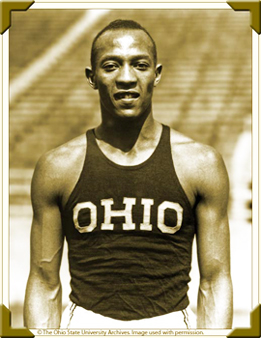|
Sens. Brown and Portman Announce Senate Passage of
Resolution to Honor Ohioan, Olympian and Civil Rights Icon
Jesse Owens
Brown’s and Portman’s Senate Resolution Honors Jesse Owens
for Contributions to Athletics and Civil Rights,
Humanitarian Efforts
Last week, U.S. Sens. Sherrod Brown (D-OH) and Rob Portman
(R-OH) announced the passage of a Senate Resolution to honor
Ohioan Jesse Owens. The resolution, introduced by Brown and
co-sponsored by Portman, recognizes Owens – one of the
greatest athletes and Olympians in world history, and a
civil rights icon who singlehandedly discredited false
theories of racial superiority at the 1936 Berlin Games.
|
 |
|
“The legacy of Ohioan Jesse Owens will stand the test of
time,” Brown said. “As an athlete, he won world records and
Olympic gold medals while dominating his sport as few ever
have or ever will. He became a global icon when – at the
1936 Berlin Games – he discredited the theory that the Aryan
race was superior to others. And he concluded his life as an
ambassador to the United States and an ambassador to the
poor. But to achieve each, Mr. Owens had to endure hatred
and bigotry from outside agitators and even the school and
country he competed for and represented. For these efforts,
he made Ohio, the United States, and the world a better
place.”
“I am pleased that the United States Senate has chosen to
honor the life and legacy of Jesse Owens. This Ohioan
inspired a nation, stood up to tyranny, and helped advance
the cause of racial equality through not only his athletic
prowess, but the content of his character,” Portman said.
“In the 1936 Olympics, his four gold medals exposed the lie
at the heart of Nazism and made him an American hero.”
At the age of nine, Owens moved from Alabama to Cleveland,
Ohio where he excelled as a track and field star – breaking
two junior high school world records, and setting two and
tying another high school world record. While a student and
athlete at The Ohio State University, Owens could not live
on campus due to a lack of housing for black students, and
could not stay at the same hotels or eat at the same
restaurants as his white teammates. But Owens endured and,
at the 1935 Big Ten Conference Track and Field
Championships, he set three world records and tied
another—in a 45 minute span and with an injured back. Owens’
most enduring legacy, however, was embarrassing the Nazi
regime that hosted the 1936 Berlin Olympics by winning four
gold medals, discrediting the false theory that racial
disparity determined athletic achievement. Despite these
accomplishments, Owens was neither recognized by Presidents
Franklin D. Roosevelt or Harry S. Truman. He was, however,
named Ambassador of Sport by President Dwight D. Eisenhower
in 1955, during which he advocated for social and economic
justice.
|